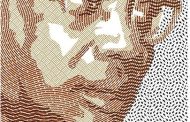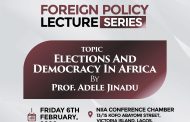Intervention is two years old this month. It is a most pleasant reality to see the survival of a medium with Intervention’s journalistic credo this far. That credo is the idea that the survival and security of the human community at whatever level of it in the post Cold War is not in the conception of security as an objective thing out there but in the lens we use to visualise it. As such, what is most primary is balancing power relations between and among the multiple expressions of humanity in the epoch, from the smallest to the largest social groupings.
This empowerment process is what can most effectively be accomplished through equality of access for all narratives because language is constitutive of power. Language is constitutive of power because truth does not lie in facts in and of themselves but in their interpretation. That makes the right to be heard or to tell one’s story the most fundamental right over and above any other. Guaranteeing everyone a chance to tell his, her or their story thus provides the language and the discursive data by which we can deconstruct all the linguistic, cultural, spatial, ecological, ethnic, regional and ideological systems in terms of hegemony or structural violence they embody.
The effort at operationalising this paradigm in the past two years has been as exciting as it has been damning. In a society with well developed oppositional conception of the Other, with easy sense of enmity, empowerment through access for differing narratives can render a medium friendless. The great joy at two is that Intervention has survived this at great social, ideological and business loses. But, it has been well worth it. Every new story that passes through our system of meaning is always a bundle of joy to the numerous hands involved in its processing, or, if you like, its creation.
Other than the paradigm related creases, our readers were initially uncomfortable with stories that had no bye-lines. It was much later that it became clear that there is nothing to that other than experimentation with a model that has been unique to the London based The Economist. Interestingly, the discomfort with stories without byelines did not come from readers alone. Stringers, some experts and some members of The Editorial Committee did not take to it easily. As it is now, the impending movements in and out of Intervention could mark its death.
Of course, there are those who complain about big grammar in the stories and features and special reports we have done. While toning down gradually is conceded, especially as new columns come on stream in due course, there is also the point that the media is not only a source of news but also of education. If the way Intervention reports makes someone to go look for the dictionary meaning of a word once awhile, it would be counted as achievement. Beyond that, there is a limit beyond which language can be generalist today. The world itself is now a world of registers and specialised terms.
It can be said on the basis of the last two years that Nigeria is truly unknowable. There is no knowing what they want to read. Many times, it is the material editors consider to be no more than a filler that attracts the highest readership. It reminds one of the debate in the mid eighties about why people were not reading newspapers. Was it because the newspapers were not carrying what they wanted or Nigeria is not a newspaper reading country?
This can be slightly more problematic for a medium such as Intervention whose journalism is, to a great extent, a function of an activist orientation and, hence, the crusading and campaigning elements here and there in our reporting. In other words, Intervention doesn’t just report the news, it intervenes because it is also keen to see Nigeria transform. The manifest intolerance for mediocrity, filibustering and lack of sense of urgency in Intervention’s language use is that intervention and that has had its alienating consequences but did it matter?
In geographical terms, some voices have not had access to Intervention. That is noted in passing. It is not because this newspaper is fixated on any geographical, political, ideological, ethnic, class, gender or generational group. It simply hasn’t got the resources to be everywhere yet.
The last crease worth mentioning is how the original idea of a small Online newspaper that would circulate to a restricted audience at home with the idea of ‘news as discourse’ has grown into a scale no one could have imagined in July 2016 when it into circulation. That space of growth in terms of number and circles of readership has left everyone scampering for strategies of coping with the unanticipated expectations. This growth is both a source of joy as much as it has imposed challenges not built into the original plan.
It is going to be a month long Second Anniversary celebrations, consisting not of eating and drinking but reflective and consultative sessions on what the next two years could be like, as much as it makes sense to talk of planning about tomorrow.
It is important at this juncture to recognise the paid and unpaid efforts of so many hands, voices and faces that have made the last two years possible. We say a mighty thank you to the members of the Editorial Committee who are leaving and welcome to those coming. We reserve a special gratitude to those who do not just read what we write but also text back immediately to say, ah, there is a grammatical error in so, so paragraph or who keep us on our toes generally with one criticism or another or moral support. All these are mightily appreciated. What they all point to is that Intervention has grown beyond any one individual in the direction of its professional and business destiny. By God Almighty, it would be there!




























